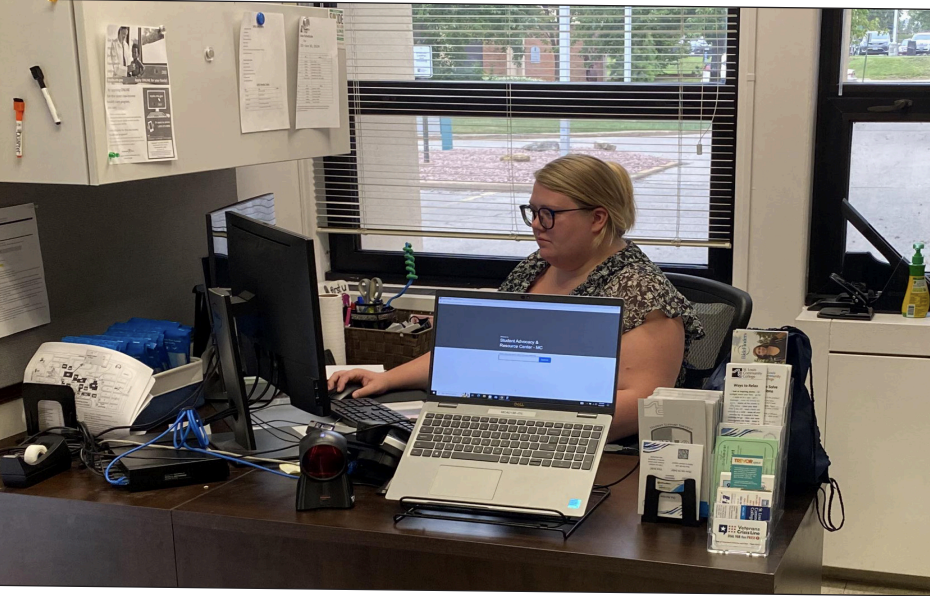Above: Basic Needs Specialist Carrie Fink works in the SARC office on Sept. 5, 2023. The offices are located in Clark Hall Room 130.
BY: MORGAN DANIELS
Staff Writer
Meramec’s Student Advocacy and Resource Center (SARC) is lively as the fall semester commences. Students walk in and out of its base of operations in Clark Hall, chatting with friends between classes, grabbing a quick snack, and engaging with the resource team. Though the space is small and tucked towards the back of the administrative building, the center’s atmosphere is inviting and welcoming to all students.
For the longest time, St. Louis Community College has had the Student Assistance Program (SAP), which recently changed its name to the Student Advocacy and Resource Center (SARC). The center at Meramec is led by Coordinator Mayuko McGuire, Basic Needs Support Specialist Carrie Fink, two student workers, and a part-time employee. Together, they offer various services, including the Archer’s Market, clothing closet, campus and community services, confidential crisis response, emergency funds, education outreach, and family services. Of those services, Archer’s market, case management, and prevention education are SARC’s three most popular services.
Free Food at Archer’s Market
After scheduling an appointment on their website, students can access the market monthly for essential pantry items, including groceries, personal care items, household supplies, and baby care items. The pantry is also accessible to online students. There are markets at Meramec, Forest Park, and Florissant Valley that can all ship food to a campus nearest the student for pick up. SARC also provides free snacks and personal care items for students in their office space to access anytime.
Free Medical and Mental Health Services
SARC’s case management service provides individualized support for students with specific needs and connects them to on-campus and community resources. They recently partnered with Unite Us, an online platform that screens individuals for their health and social needs and refers them to specific community resources. The new partnership makes the case management service at SARC much more efficient and quicker.
“If students agree to participate in that program, we can push that student to that service directly instead of calling and waiting for it,” said McGuire.
Prevention Education
SARC also emphasizes its prevention education initiatives, inviting Meramec students to learn more about pressing community health concerns to encourage them to utilize their resources. September is Suicide Awareness Month, so SARC is partnering with the Access Office and Counseling departments to host two events on September 12th and 13th. Students will get to make stress balls while learning about suicide prevention efforts. October will then mark the beginning of Domestic Violence Awareness Month, and SARC will host more informational sessions and activities to spread awareness and advocate for ending domestic violence. More details and information about these events are on the STLCC event calendar.
“The more we get to know them, the more we get to serve,” said McGuire.
Last year, the center recorded close to one thousand visits each month. Though that number can include visits from the same students, it highlights SARC’s presence in students’ lives as they advocate for their well-being. With a new semester underway, the center has been busy.
“We are busiest at the beginning of the semester,” McGuire shared, and she anticipates another increase in visits as financial aid and withdrawal deadlines approach throughout the fall semester. Outside those times, though, the SARC office encourages students to stop by and get to know the center.
“The more we get to know them, the more we get to serve,” McGuire said. That way, students feel comfortable asking the center for help if or when a situation arises.
The Stigma of Asking for Help
Unfortunately, the stigma and hesitancy around asking for assistance or support is common among college students.
A national survey of 195,000 college students by the Hope Center for College, Community, and Justice at Temple University found that 61% of two-year college students have a basic need insecurity (BNI). BNIs include students who’ve experienced food insecurity, housing insecurity, or homelessness within the last year. Of that 61% of students, only 34% sought out and used their campus resources for support. These data points could be considered to be alarming to community colleges and other two-year institutions because nearly one-half of students are seeking campus resources, and the other half aren’t getting their needs fulfilled.
While campuses must bolster their outreach and bring awareness to the support programs they have in place, it is also critical that all enrolled students are aware of and access those resources.
According to the survey, the top three reasons students didn’t use their campus support systems were because they thought they were ineligible, believed other people needed the programs more than them, or didn’t know how to apply.
In response to the reality that students aren’t always sure if they have a legitimate need, Mayuko McGuire believes, “Anything in your life counts. It can be tiny, like, ‘I’m so frustrated with this class; I need to talk about it.’ That’s fine. It can be life challenges that we need to tend to a bit more deeper, and that’s fine too. We are here to hold your hand through your STLCC journey.”
Virtual and Walk-in Appointments
All students are eligible to receive the services SARC provides. It is a resource created solely for students because everyone deserves to have their needs met and questions answered. For students interested in learning more about their services or have a need they’d like to address, the center accepts walk-ins and virtual appointments that can be scheduled through the Navigate app. Students can also fill out an outreach request form, available on SARC’s website; it only takes a few minutes to complete. Students do not have to have a specific need when filling it out. They can be a part of SARC’s email list, which will send them resources, programs, and events on campus and in the community.
The Student Advocacy and Resource Center works diligently to make its services as accessible as possible. Therefore, students must also take the time to engage with said services.
“Nothing is too small for us,” McGuire emphasized. “Any question is important, so don’t hesitate. It doesn’t need to be a need; it can be just a question. Come visit us; we will try to solve it with you.”
If you want to take advantage of SARC’s resources, contact them at mcsarc@stlcc.edu or 314-984-7887.











